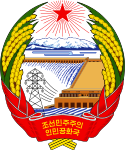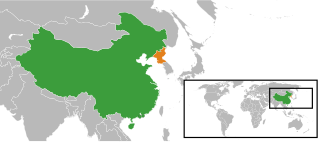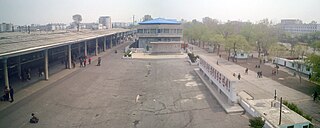 |
|---|
The North Korean economic reform refers to the program of reform and restructuring of the North Korean economy. Economic reforms have been increasing in the last years, particularly after Kim Jong Un came to power in 2012. [1] [2]
 |
|---|
The North Korean economic reform refers to the program of reform and restructuring of the North Korean economy. Economic reforms have been increasing in the last years, particularly after Kim Jong Un came to power in 2012. [1] [2]
Economic reforms in North Korea has its roots to the 1970s, when North Korean government agencies, provincial governments and military units were unofficially granted permission to establish their own companies. Number of such companies have increased dramatically since the 2000s. [1]
North Korea's economic growth under Kim Jong Un is estimated to be ranging from 1 percent to 5 percent. [3] North Korea expert Andrei Lankov has said that North Korea's real growth rate is 3–4%. [4]
Economic reforms in North Korea has been encouraged by China. While visiting Pyongyang in June 2019, Chinese paramount leader Xi Jinping said that Kim Jong Un had “initiated a new strategic line of economic development and improving people’s livelihoods, raising socialist construction in the country to a new high tide.” [5]

North Korea, officially the Democratic People's Republic of Korea (DPRK), is a country in East Asia. It constitutes the northern half of the Korean Peninsula and borders China and Russia to the north at the Yalu (Amnok) and Tumen rivers, and South Korea to the south at the Korean Demilitarized Zone. The country's western border is formed by the Yellow Sea, while its eastern border is defined by the Sea of Japan. North Korea, like its southern counterpart, claims to be the legitimate government of the entire peninsula and adjacent islands. Pyongyang is the capital and largest city.

The politics of North Korea takes place within the framework of the official state philosophy, Kimilsungism-Kimjongilism. Juche, which is a part of Kimilsungism-Kimjongilism, is the belief that only through self-reliance and a strong independent state, can true socialism be achieved.

The economy of North Korea is a centrally planned economy, following Juche, where the role of market allocation schemes is limited, although increasing. As of 2022, North Korea continues its basic adherence to a centralized planned economy. With a total gross domestic product of $28.500 billion as of 2016, there has been some economic liberalization, particularly after Kim Jong Un assumed the leadership in 2012, but reports conflict over particular legislation and enactment. Since the 1990s, informal market activity has increased, which the government has tolerated. These markets are referred to as 'Jangmadang', and were formed as a result of the economic collapse during the 1990s, which made the regime unable to distribute food to its people.

Kim Il Sung University (Korean: 김일성종합대학) is a university in Taesong, Pyongyang, North Korea. Founded on 1 October 1946, it is the first institution of higher learning in North Korea since its foundation.
The mass media in North Korea is amongst the most strictly controlled in the world. The constitution nominally provides for freedom of speech and the press. However, the government routinely disregards these rights, and seeks to mold information at its source. A typical example of this was the death of Kim Jong Il, news of which was not divulged until two days after it occurred. Kim Jong Un, who replaced his father as the leader, has largely followed in the footsteps of both his grandfather, Kim Il Sung, and his father. However, new technologies are being made more freely available in the country. State-run media outlets are setting up websites, while mobile phone ownership in the country has escalated rapidly. "There is no country which monopolizes and controls successfully the internet and information as North Korea does," said Kang Shin-sam, an expert on North Korean technology and co-head of the International Solidarity for Freedom of Information in North Korea, a nonprofit based in South Korea. North Korea has about four million mobile-phone subscribers circa 2022—roughly one-sixth of the population and four times the number in 2012, according to an estimate by Kim Yon-ho, a senior researcher at Johns Hopkins University's School of Advanced International Studies.
The North Korean famine, also known as the Arduous March or the March of Suffering, was a period of mass starvation together with a general economic crisis from 1994 to 1998 in North Korea. During this time there was an increase in defection from North Korea which peaked towards the end of the famine period.

Kim Jong Un is a North Korean politician who has been supreme leader of North Korea since 2011 and the leader of the Workers' Party of Korea (WPK) since 2012. He is the third son of Kim Jong Il, who was North Korea's second supreme leader from 1994 until his death in 2011, and Ko Yong Hui. He is a grandson of Kim Il Sung, who was the founder and first supreme leader of North Korea from its establishment in 1948 until his death in 1994.

Kim Ok is a former North Korean government employee who served as Kim Jong Il's personal secretary from the 1980s until his death. After the death of Ko Yong-hui in August 2004, she regularly met with foreign officials as de facto first lady, and was rumored to be the supreme leader's fourth wife.
The Communist movement in Korea emerged as a political movement in the early 20th century. Although the movement had a minor role in pre-war politics, the division between the communist North Korea and the anti-communist South Korea came to dominate Korean political life in the post-World War II era. North Korea, officially the Democratic People's Republic of Korea, continues to be a Jucheist state under the rule of the Workers' Party of Korea. In South Korea, the National Security Law has been used to criminalize advocacy of communism and groups suspected of alignment with North Korea. Due to the end of economic aid from the Soviet Union after its dissolution in 1991, due to the impractical ideological application of Stalinist policies in North Korea over years of economic slowdown in the 1980s and receding during the 1990s, North Korea continues to nominally uphold Communism, but has replaced Marxism-Leninism with the Juche idea. References to Communism were removed in the North Korean 1992 and 1998 constitutional revisions to make way for the personality cult of Kim's family dictatorship and the North Korean market economy reform. The Workers' Party of Korea under the leadership of Kim Jong Un later reconfirmed commitment to the establishment of a communist society, but orthodox Marxism has since been largely tabled in favor of "Socialism in our style". Officially, the DPRK still retains a command economy with complete state control of industry and agriculture. North Korea maintains collectivized farms and state-funded education and healthcare.

The bilateral relations between the People's Republic of China (PRC) and the Democratic People's Republic of Korea (DPRK) have been generally friendly, although they were sometimes strained in recent years because of North Korea's nuclear program. They have a close special relationship and China is often considered to be North Korea's closest ally. China and North Korea have a mutual aid and co-operation treaty, signed in 1961, which is currently the only defense treaty either country has with any nation.

The Workers' Party of Korea (WPK) is the sole ruling party of the Democratic People's Republic of Korea, commonly known as North Korea. Founded in 1949 from the merger of the Workers' Party of North Korea and the Workers' Party of South Korea, the WPK is the oldest active party in Korea. It also controls the Korean People's Army, North Korea's armed forces. The WPK is the largest party represented in the Supreme People's Assembly and coexists with two other legal parties making up the Democratic Front for the Reunification of Korea. However, these minor parties are completely subservient to the WPK and must accept the WPK's "leading role" as a condition of their existence. The WPK is banned in the Republic of Korea under the National Security Act and is sanctioned by the United Nations, the European Union, Australia, and the United States.

Kim Il Sung was a North Korean politician and the founder of North Korea, which he led as Supreme Leader from the country's establishment in 1948 until his death in 1994. Afterwards, he was declared eternal president.

Daily NK is an online newspaper based in Seoul, South Korea, where it reports on various aspects of North Korean society from information obtained from inside and outside of North Korea via a network of informants. North Korea is ranked last out of 180 in the 2023 World Press Freedom Index, which is compiled by Reporters Without Borders.

Koryolink is a North Korean wireless telecommunications provider. The company is a cellular operator held by Cheo Technology, a joint venture between Orascom Telecom Media and Technology Holding (OTMT) which holds 75% of the shares, and the state-owned Korea Post and Telecommunications Corporation (KPTC). Koryolink started in 2008 and was the first 3G mobile operator in North Korea.
Media coverage of North Korea is hampered by an extreme lack of reliable information, coupled with an abundant number of sensationalist falsehoods. There are a number of reasons for this lack of information and incorrect stories.

Jangmadang are North Korean local markets, farmers' markets, black markets and bazaars. Since the North Korean famine in the 1990s, they have formed a large informal economy, and the government has become more lenient towards them. However, merchants still face heavy regulations. A majority of North Koreans have become dependent on jangmadang for their survival.
The Reconnaissance General Bureau is a North Korean intelligence agency that manages the state's clandestine operations. Most of their operations have a specific focus on Japan, South Korea, and the United States. It was established in 2009.

Tae Yong-ho, also known by his pseudonym Tae Ku-min, is a North Korean-born South Korean politician and former diplomat who is serving as a member of the National Assembly for the Gangnam district of Seoul. After studying abroad in Beijing, Mainland China for a decade, he became North Korea's deputy ambassador to the United Kingdom, prior to defecting with his family to South Korea in 2016. In August 2016, the South Korean government confirmed that Thae and his family were under their protection.

The 2019 Koreas–United States DMZ Summit was a one-day summit held at the Korean Demilitarized Zone between North Korean chairman Kim Jong Un, U.S. president Donald Trump, and South Korean president Moon Jae-in, following the 2019 G20 Osaka summit. Trump briefly stepped over the border at 3:45 PM (GMT+9) on June 30, marking the first time a sitting U.S. president had set foot on North Korean soil. It was also the second time since the end of the Korean War in 1953 that a North Korean leader entered the South's territory, following the April 2018 inter-Korean summit. Senior White House advisors Ivanka Trump and Jared Kushner also attended the summit, with Ivanka Trump and U.S. envoy to South Korea Harry B. Harris Jr. holding a meeting with Kim later broadcast on North Korean television.

The COVID-19 pandemic in North Korea was part of an ongoing global pandemic of coronavirus disease 2019 (COVID-19), a novel infectious disease caused by severe acute respiratory syndrome coronavirus 2 (SARS-CoV-2). North Korea confirmed its first case on 8 May 2022.